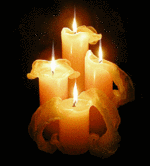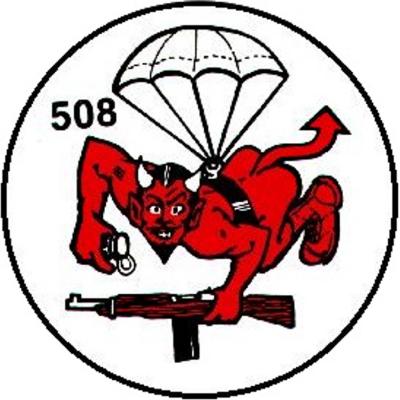
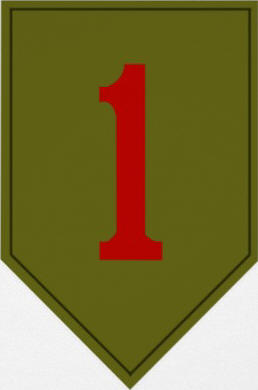
William "Bill" F Ryan
Thank you so much to Bill Ryan to send me his documents and to accept that we meet and answer all my questions! Thank you to Mathilde and Marcel (Remember Museum) for welcoming us. And thank you to my friend Dominique have played translator.
|
IN MEMORIAM |
|
It's with great sadness that I must inform you of the death of William "Bill" Ryan. He passed away peacefully on February 23, 2015. We should never forget that this man has done for us; Rest in Peace Bill thank you so much for our freedom. God Bless you! |
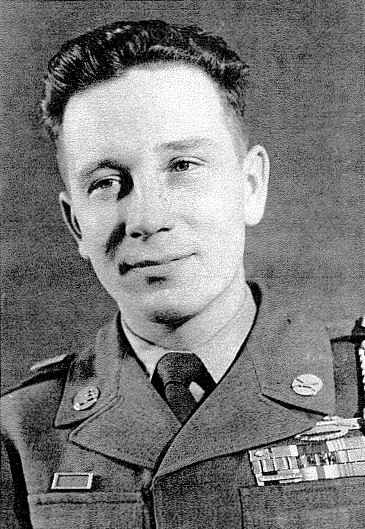 <-
Bill in 1945
<-
Bill in 1945
Today ->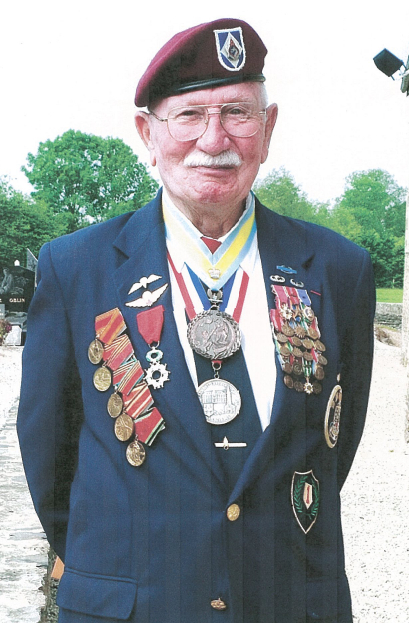
William "Bill" F Ryan was born December 3, 1924 in Boston, Massachusetts. He is Irish descent. His father, William T Ryan was an electrician in the US Navy. He ended his career in 1945 with the rank of Lieutenant Commander. His mom called Theresa Madden. Bill has a sister, Peggy, who in three years older than him. Bill 12 years old when his mother passed away.
On 7
December 1941, the
Japanese attacked Pearl
Harbor. America
entered the war. Many
lives were suddenly changed.
Bill Ryan is
older than 16 years. Like many
young Americans, Bill said the
hell with school, his place
was in the U.S. Armed Force.
But he is no
older than 16 years.
“I won’t go into the long and boring story about how I tried to enlist in the US Army, with a false birth certificate, and how they caught me, and recommended that I join the merchant marine.”
The Armed Forces had priority on all men 17 years and up. The merchant marine was experiencing an acute shortage of personnel. So, the Maritime Commission authorized the hiring of young boys who were at least 16 years of age, and had their parent’s permission.
« I inquired about employment in the morning, was given a quick physichal, and told to return in the afternoon. When I reported, I was given three Coast Guard tickets, wiper, messman, and ordinary seaman. I selected to become a « wiper ». I was given a piece if paper that had the name of a ship, and the location. I was told to report to that ship immediately. No training, no shots, no uniforms, just a slip of paper.
I reported on board my new home around four in the afternoon. Luckily, the first seaman I met, was a firemenwatertender. He showed me where my cabin was, the mess, and the fiddley, that led down to the engine room. He told me to get myself squared away, and to report to the engine room at 0800 hours, the following morning. Later that night, I was joined by two other wipers, who like me, were only sixteen. None of us had received any training, and had never been to sea, at least not open sea.
After breakfast, the three of us reported to the engine room. While we were waiting for someone to tell us what our duties were, the telegraph started to clang, the engineer started to move various levers and valves, and all at once I realized, we were getting underway. For where, God only knew. »
Bill Ryan was merchant marine sailor and participated in three convoys to northern Russian at the port of Murmansk and Archangel. The first trip was four and one half months. During this trip, Bill was selected to become a Fireman-watertender.
“During my first trip, I was selected to become a Fireman-watertender because a sailor jumping ship in Glasgow, Scotland”
At the end of the last convoy, once back in the States, Bill received a leave of thirty days. When his leave was up, he went to the Union Hall and put in his card, for a fireman watertender’s position.
“When they asked to see my US Coast Guard certificate, that qualified me as a FWT, all I had was the ship’s discharge, that listed my job as a fireman-watertender. Because I did not have a Coast Guard certificate, as a FWT, I had to report to the US Maritime Training Station, located at Sheepshead Bay, NY.”
During this period, he received a weekend pass. With four shipmates, he went to the Coney Island Amusement Park.
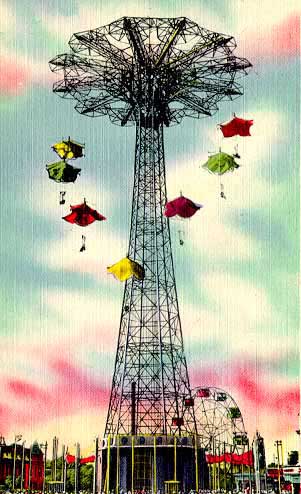 <- The Jump Tower,
Coney Island
<- The Jump Tower,
Coney Island
“Located at the Park, was the first 250’ parachute tower. You sat in what I remembered to be, only a piece of wood, with a back rest and a seat belt. The parachute was pulled to the top of the tower, and when it was released, it came down on cables. The parachute allowed you to come to a stop, about two feet off the ground. When we arrived at the tower, no one wanted to try it. Because I was the local hero, having made a convoy to North Russia, they prodded me into making a jump. As I remember it, the cost was all of five cents. I have to admit, I was a little bit afraid, even though I had seen a few people make the jump, and they waked away smiling.
I can’t begin to tell you, how great I felt, not on the way up, but on the way down. I had such a great time, I gave the attendent another nickel, and up I went for my second jump.”
After the Merchant Marine, in May 1943, Bill Ryan enlisted in the regular army. He followed standard infantry training at Camp Blanding in Florida during 17 weeks. During this period, an Airborne Recruiting Team put on a demonstration. Bill, a young red blooded American decided to volunteer. In October 1943, he was sent to Fort Benning, Georgia.
“At Fort Benning, we were given a card, on which you would list the date, time, altitude, weather and remarks, for each jump that you made. Being a big city “smart ass”, I put on the card the two jumps, that I had made at Coney Island. I made the mistake of telling one of the TAC-NCOs, that I was already a qualified paratrooper, and I showed him the card. At that time, most of the TAC-NCOs were all good old Southern boys, and as you can imagine, they did not have to much love, for us Yankees. After he finished reading the card, he asked me: “Where the hell is Coney Island?” Stupid me, I went ahead and told him the full story. He then told me, “After retreat, you report to my room.”
To make a long story short, this pride of the south told me, that he was going to make an example of me, for being a wise guy. Whenever our paths crossed, he would order me to do twenty five push-ups, and after retreat I had to report to the Mess Hall, where I soon became intimate with that dreaded “grease trap”. I had this duty, each and every night, until I Graduated. One good thing, he never rasied the number of push-ups, like some of the TAC-NCOs did. You can now understand how I became so good at push-ups.
In addition to push-ups, I also had trouble properly executing a parachute lading fall (PLF). I had no trouble doing a “PLF” to the right, but for the life of me, I had trouble, trying to do a “PLF” to the left. As luck would have it, this same TAC-NCO, who had me doing all of that extra duty, was in charge. I am sure he felt sorry for me, because he passed me.
I have no special comments about the Airborne Training, I throughly enjoyed it. Our class was a bit different, because we were required to make two night jumps, not the standard one jump. I found out later, that they knew the Normandy jump was going to be a night jump, so they wanted to make sure, we were fully qualified in night jumping.”
In December 1943, Bill Ryan, a young paratrooper is sent with his comrades in England.
“When I arrived in Scotland, on the 23d of December 1943, two hundred paratroopers, were assigned to a Guard Company, located at Merryhill Barracks, in Glasgow, Scotland. Talk about being surprised, as you all know, I made a few trips to Glasgow, during my merchant service. To this day, I have no idea of what we were guarding, all I knew was I was back in heaven, and the war was the last thing I was thinking about.
I knew it couldn’t last, and in March 1944, we were all transferred to the Replacement Depot, located at Tidworth Barracks, in Southern England. Due to the large number of casualties, that the First Infantry Division suffered, during the fighting in Sicily, they had priority for replacements. Even though we were all airborne qualified, we were still classified as “rifleman”. I was assigned to Company I, 16th Infantry Regiment. After a few months of extensive training, on the afternoon of the 3d of June 1944, we did start to load on the troopship. The ship was anchored out, in the Weymouth harbour, due to the large number of transports, and other landing craft in the area. We were shuttled, from the dock to the ship, by landing craft. The one good thing was, that we did not have to flight our way, up the scrambling nets, with all of our equipment. They had two gangways set up, that made the boarding very easy.
We were assigned a compartment, and we then started to fight, over who would get what bunk. As I remember it the bunks were four high. Being an old merchant marine sailor, I opted for one of the top canvas bunks, I was safe from all those GIs, that I knew, were going to get sick. As it turned out, I was right.
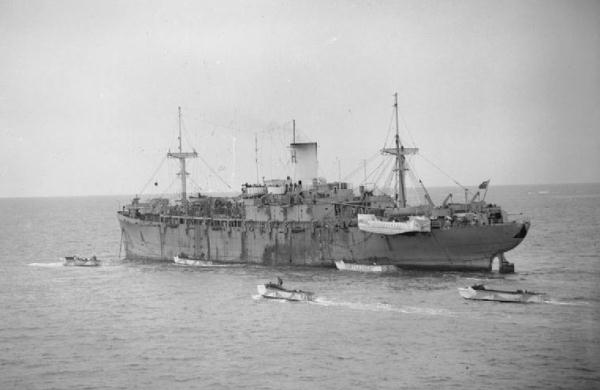
On the afternoon of 4 June, the HMS Empire Anvil left the protection of the harbour of Weymouth. The English Channel was very rough, many people began to get sick. The invasion was originally scheduled for the morning of the 5th of June was postponed until the 6th of June because of bad weather. Most of the men remained in their compartments.
“Me, I went on deck, and stayed there, for as long as they allowed me. I did not want to return to that stinking compartment.”
Later that evening, they received their meals that resembled that of a condemned man says Bill. Then they were ordered to return to the compartments and wait to be called on the upper deck. Bill remembers:
“Forget all those Gis, who were violently seasick, try to imagine what was going through the minds of the troops. We were about to make our first contact with the enemy. I have to give a lot of credit, to the old timers, who had already been through Africa and Sicily, they did their best, to motivate the men, and they tried to settle them down. While awaiting the call, most of the men could have cared less about meeting the Germans, they were so sick, after being on that rocking and rolling ship for over 3 days, they could care less if they died.”
Finally, the men were ordered to go on deck. A nice surprise awaited them, the landing craft, LCA were not in the water. They were hanging alongside of the boat deck. The men had to climb in, sit down and wait until the barge is lowered.
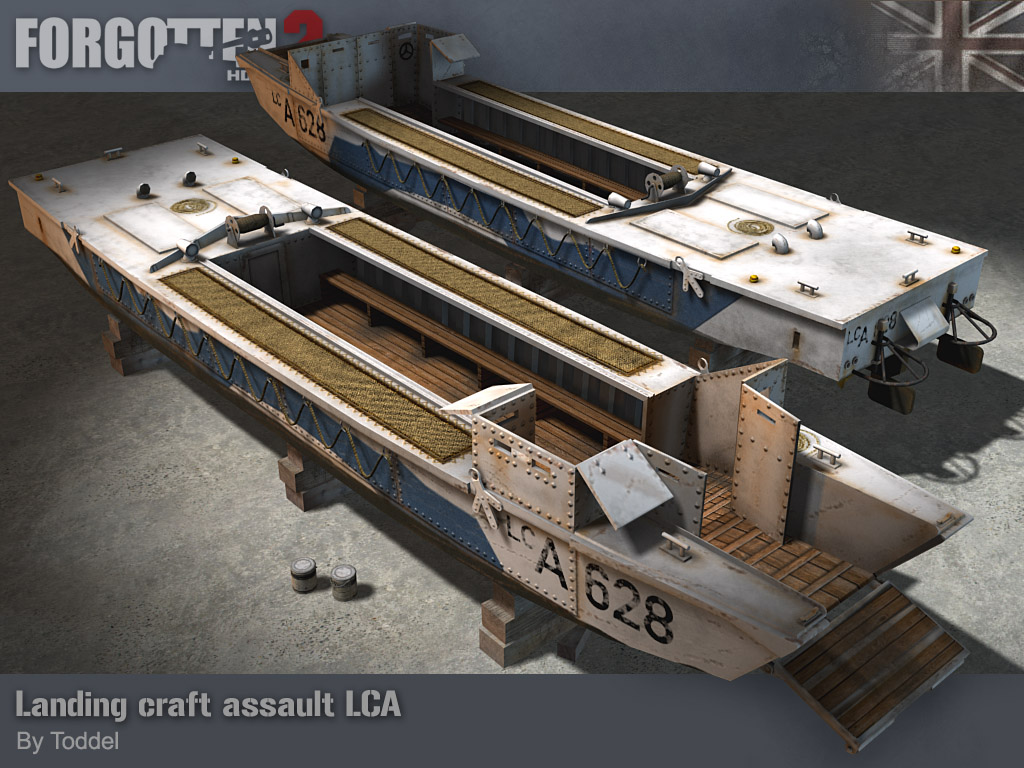
“When all of the boats were loaded, we proceeded to form up for the twelve mile run to our assigned section on Omaha Beach.
Once we departed the lee side of the transport, we were like a cork in a bathtub. Everyone who was not sick, immediately became sick. I believe I was the only one in my boat that was not seasick. This was due to my service in the merchant marine, before I enlisted in the Army.
On the way to the Beach, we lost two boats that were swamped by the high waves. The coxswains of the four remaining boats became disoriented, due to the missing patrol boat that was suppose to insure that we were on the right course, for our assigned area. Also, the beach area was covered with haze and smoke from the earlier bombardment, which made identification of landmarks impossible. This coupled with a very strong current, forced our boats off course, two miles to the east. By the time we retraced our course, we saw that two rifle companies that were suppose to have landed on our right flank (Easy Red), had landed on our beach (Fox Green). Their landing craft had the beach fouled, so we were unable to land. After circling around off the beach, like a bunch of sitting ducks, we finally made our run into the beach.
By this time the Germans had the beach under very heavy fire. Our four remaining boats suffered heavily in the last yards of our approach. The command party craft struck a mine and was set afire by machine gun fire, two other boats received hits (or struck mines), and the fourth boat was hung up on one of the beach obstacles under heavy maching gun fire. Casualties were heavy. When my boat was hit, I was knocked unconscious. I was later told, that two men from my boat dragged me ashore, and placed me against the face of a small embankment, at the base of the hill. I remained at this location until that night, when the wounded were evacuated back to England.
All day long on the 6th of June, I had a front row seat, observing all of the organized/unorganized confusion that was occurring, not only on the beach, but out on the water. If only I had a tape recorder, or a movie camera.
One incident has remained with me, after all these years. I vividly remember a US Navy destroyer coming as close to the beach as he could, without running aground. He turned the ship broadside, and started to fire on the various bunkers, gun emplacements and the trenches, that had not been destroyed by the Army Air Corps, and the Navy, during the pre-invasion bombardment. These positions were keeping the troops pin down on the beach. This destroyer was later joined by other ships. I firmly believe that the fire power of those small ships, was what turned certain defeat on Omaha Beach into a victory.
I read after the war, that the skipper of that first destroyer was ordered back out to sea, to a more protected position. He refused, and said he was not going to leave his position as long as the troops were pin down on the beach. This is just one of the many acts of heroism that took place during the early hours on Omaha Beach.”
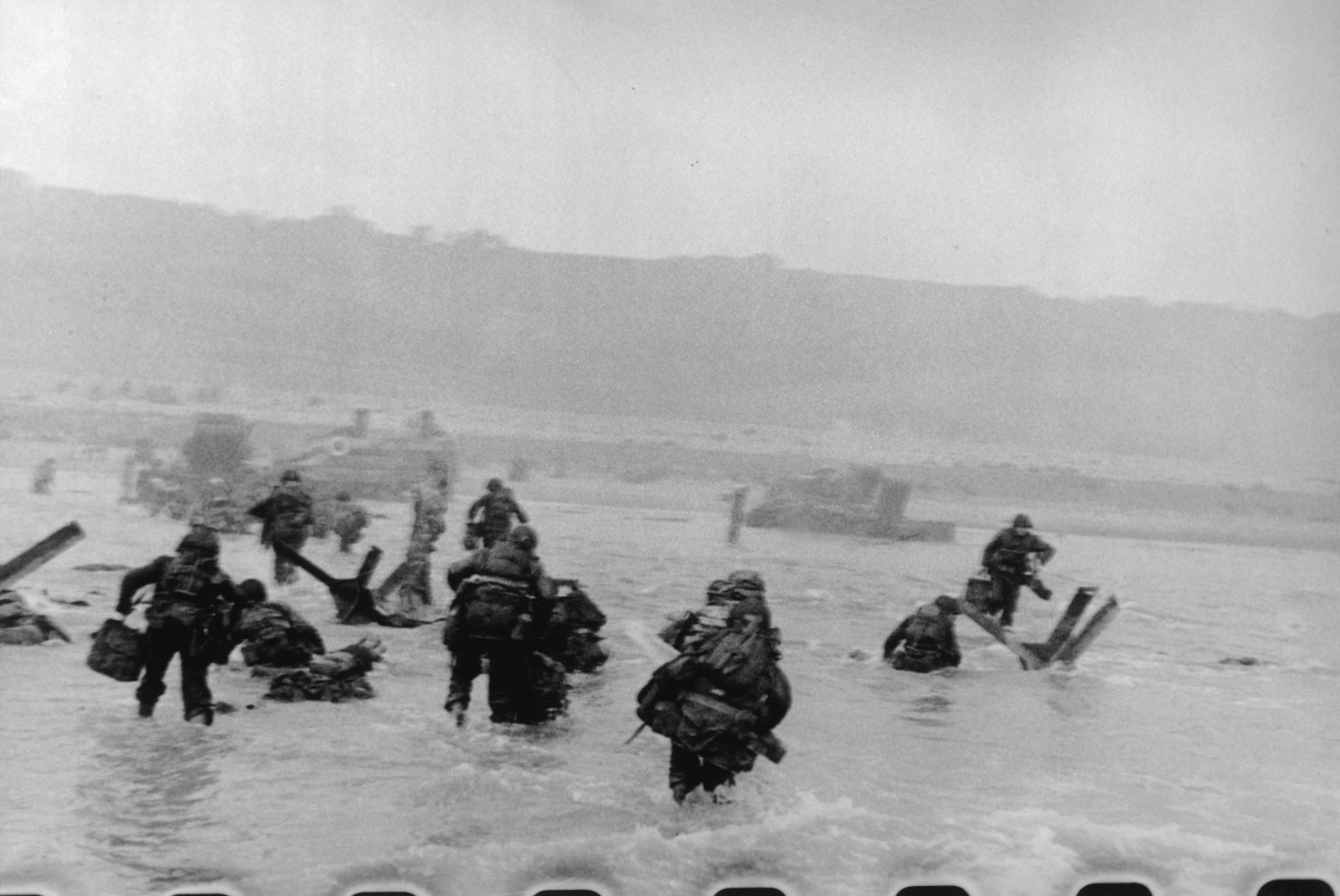
Men of the 16th Infantry Regiment rush toward the shelter of amphibious tanks at the water’s edge of Easy Red sector, Omaha Beach, on D-Day, June 6, 1944.
Evacuated
to England, Bill Ryan
was first sent to a hospital in
Southampton after a few days,
he was sent to the 316th
General Hospital in Glasgow,
Scotland.
When he was declared fit for
duty in July 1944, Bill was
reported to the Personnel Officer
to receive his new assignment.
“After he checked my records, the Personnel Officer asked me if I wanted to be assigned to an airborne unit. Picture this, here I am all of nineteen years old, have just been awarded a Purple Heart and a combat infantryman’s badge. I raised my voice and said: “Of course I want to be assigned to an airborne unit, why the hell do you think I took all of that training?” Believe it or not, my outburst had no effect on this warrant officer. The next day, I was transferred to the 508th Airborne Infantry Regiment, that was stationed in the town of Nottingham.”
Bill Ryan was assigned to Company I of the 508th Parachute Infantry Regiment, 82nd Airborne Division. He participated in a lot of very hard combat training, to include a few practice jumps. On several occasions, the paratroopers were ordered to prepare for combat jump but was canceled due to advance of the Allied forces. But finally, on Sunday the 17th September 1944, he embarked on his first combat jump during Operation Market Garden.
“My stick landed about 1330 hours, on a perfect day, the sun was shinning and the wind was down. We jumped at an altitude of only 700 feet, to make sure the Germans had a short time to engage us in the air. As I remember it, when my chute opened I had two oscillations and I hit the ground. I immediately got out of my chute, picked up additional ammo, and took off for the tree line.
I thanked the Lord, that for about four minutes, we did not receive any enemy fire. As I was running for the tree line, a large group of Dutch civilians were coming onto the drop zone. We told them, to get back to the safety of the woods. It was at this time, that I realized most of them were speaking perfect English. They wanted to tell us where the Germans were, and from that moment on, I had a lot of respect for the Dutch people.
Our objective was the crossroads outside of the small village of Beek. We reached the crossroads, with a minimum of fighting, and soon we were attempting to get a recon group across a small river. They made it across, but they were taken heavy motor and 88mm fire, from the woods, that was about six hundred yards from the river. We had no artillery, or tanks so we had to advance to the rear. We remained dug in, until a major river crossing was undertaken, which was delayed, due to the lack of suitible boats, and the british being unable to get the boats on that damn two lane road. (Hells Highway) After we departed Holland, I heard the full story, about that river crossing, and I was very happy that the 508th, did not have that honor.
We finally crossed the river, by way of that famous railroad bridge. We advanced up the main road to Arnhem, and then we were ordered to dig in. There we sat, waiting for the British 3d Corps to come through our lines. Unfortunately, this never happened and the British Airborne in Arnhem, had to surrender, due to the large number of casualties they had, and they were out of ammunition.
My company was on outpost, when the few survivors came through our lines. We fed them, clothed them and took care of their medical needs, As a result, the men of the 508th PIR, were made honorary “paras”, in the British Army. To this day, I wear their wings with pride.”
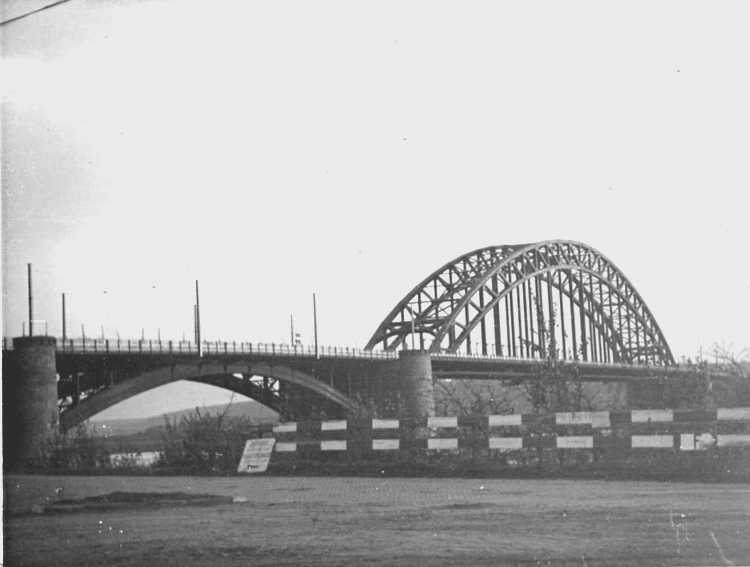
The Nijmegen Bridge was attacked by 508th
On the 11th of November 1944, the men of the 82nd Airborne were relieved by units of the Canadian army. Along the way, they passed many convoys truck 2 ½ tons carrying the British and Canadian troops heading to the front lines.
“Here we were a bunch of paras, cold, wet, dirty and very tired.”
When they arrived at the rest camp, located in France, the rumors started. The best one was that the 508th was going back to Nottingham, England to await it’s next assignment.
“After a few days, we all knew that was never going to happen. The Division Commanding General Jimmy Gavin, put out the word, that the 82nd Airborne Division will immediately reagain it’s combat readiness status. We were issued new clothing and proper maintenance was performed on all of our weapons. We were all informed of what we were expected to carry with us, if we were assigned a new mission. As a result of General Gavin’s foresight, the 82nd Division was the only combat ready Division in reserve.”
During this period, passes were distributed to England or to Paris. Bill had no girlfriend who was waiting in England, so he decided to go to Paris.
“I joined a group “paras”, who had fought in Normandy, because they led me to believe that they knew where to go. Wrong, I soon found myself on my own, with the exception of my squad leader. The first day I was in Paris, I met a very lovely French girl, who was from the island of Corsica.
Before I knew it, my three days were up, being a typical soldier, I decided to hang around Paris, for a few more days. One night, I was walking across from the Opera House, and unfortunately apprehended by the local Military Police. I was taken to a very old French Prison, that was located on the Island of St Germain, in the middle of the Seine River.
During a conversation with my fellow prisoners, I was told, not to tell the authorities what unit I was from. Their reasoning was, that they would not send me back to the front line. As you can imagine, most of these so-called soldiers, were not “paras”, or from an Infantry Division. In other words, they were the rear area heroes, who we infantryman had a great dislike for.
When I was taken out for processing, I readily told them, that I was from the 508th PIR. That seemed to impress them, because I was given what we call a provisional pass, and told to report back to my unit ASAP. Granted, I did take the long way home, and as a result, I was gone for a period of seven days. Lets face it, I had to hitchhike all the way from Paris to Reims, France.
When I reported to the company orderly room, the ISG asked me, if I had a good time?He then told me to report to my platoon, because I was being transferred. The original plan was to send the 82nd and 101st Divisions, back to England, to get ready for another combat jump. They did not want to take us young “paras”, with them. Also, the front line infantry divisions were short of replacements, due to the heavy fighting in the Hurtgen Forest, and trying to capture the German city of Aachen. I was not alone, a large number of paras were being sent to different infantry divisions. As luck would have it, I was once again assigned to the Big Red One. When I arrived at the Replacement Depot at the 1st Division, I was told I was assigned to the 26th Infantry Regiment, not my old 16th. Now that I was an old combat soldier, I tried to complain, but I was told in no uncertain terms, that I would obey the order.
I was assigned to Headquarters, 2d Battalion, 26th Infantry Regiment. I must admit, they gave me a good job, driving the S2 (intelligence) Officer.
On the 16th of December 1944, my Regiment was dug in, around a place called Elsenborn Ridge, that was at the center of the 1st Division’s defensive positions where it reinforced the north shoulder of the German penetration.
A funny story took place one day. We sent our K-ration boxes from foxehole to foxehole throwing them. The Germans fought like the ball-trap. Each time they touched, we insulted the Germans.
I am happy to report, that the 1st Division did not give up an inch of ground. Granted, the main attack was to our south, however, we had our share of action. As you all know we repulsed the German attack, and in a matter of months, we found ourselves in Czechoslovakia.”
During the
Battle of the Bulge, Bill Ryan
was wounded for the second time.
"While on patrol, a man
stepped on a bouncing betty.
The mine exploded
but was a
little crooked. I was hit in
the knee and leg. But I
did not feel anything until I removed
my sock I saw
the blood. "
At the end of the war, Bill
had not enough
points to be
demobilized, he was missing two
of the 80 required.
Therefore, he and 20 of his
comrades were assigned to the
264th Infantry
Regiment, 66th
Infantry Division, which
was in Marseille.
The division would
be sent to Japan.
But the explosion of the
atomic bomb
ended the war.
“When the war in the Pacific ended in August, this Division was onboard the transports. How it happened, no one knows to this date, but we headed west not east. When we went through the Strait of Gibraltar, we knew we were on our way home.
Within a matter of a few weeks, I was discharged from the Army. All of my buddies were still in Germany, with over one hundred points, waiting to come home.”
Bill Ryan was discharged in October 1945. But he was not doing it for the
civilian life. On the 26th of December 1945, he reenlisted in the US
Army against the advice of his father.
These assignments were:
From 1946 to 1948, HQ, 2nd Battalion, 26th Infantry Regiment , Germany
From November 1948 to May 1949 : 64th MP Platoon , Governor's Island , NY city .
Patrol Times Square.
From May 1949 to February 1952: 1st Infantry Division Band , Company I, 16th
Infantry Regiment , Germany
From February 1952 to April 1954 : Korean War. I Corps Artillery.
From April 1954 to March 1955 : Battery C , 16th AAA Bn ( 90mm ) in Medford , MA
From March 1955 to January 1956 : 15th Air Defense Regiment, Fort Banks , MA
From January 1956 to March 1957 : 68th AAA Bn ( 90mm ), Korea ( 2 Battle Star )
From March 1957 to February 1962 : Battery A, 3rd Msl Bn, 5th ADA Regt , Lincoln
, MA
From February 1962 to October 1963 : A battery , 6th Msl Bn, 71st ADA Regt ,
Fort Bliss , TX
From October 1963 to May 1965 : Battery C , 3rd Msl Bn, 5th ADA Regt , Korea
From May 1965 to September 1965 : 18th Airborne Corps , Dominican Republic
From September 1965 to May 1968 : HQ , 24th ADA Group, Coventry , Ireland
From May 1968 to January 1970 : Vietnam War . (6 Battle Stars ) Bill Ryan had
different assignments :
HQ , 6th Msl Bn, 56th ADA Regt
HQ , 97th ADA Group
125th Transportation Command located in Saigon
From January 1970 to December 1973 : 24th ADA Group, Coventry , R.I.
In December 1973, Bill Ryan retired after 30 years and three months in the
service of his country with the rank of Command Sergeant Major.
Bill Ryan married Lorrene with whom he had four children, three boys and a girl.
When he retired from the Army, he sold his home in Rhode Island and he took his
boat to Florida. Now he lives peacefully there on his military pension.
"Now in my twilight years, I can look back and without hesitation say that
I was one lucky “SOB”.
I have my health, a great boat, a restfull lifestyle. But most of all, since I
returned to Russia in 1991, I have become friends with a large number of great
mates.
In June 1994, 50 years later, I returned to Omaha Beach. Even though I was
stationed in Germany for 5 years after the end of the war, this would be my
first return visit to Omaha Beach.
During the period from 18 to 22 September 2003, I joined up with members of the
British Airborne Association, and made a return trip to Arnhem, Nijmegen and the
surrounding area . We spent most of the time, in and around Arnhem, however,
seeing as I was the only Yank in the group, they did spend five hours at
Nijmegen and they stopped the bus at the Beek crossroads , so I could take some
pictures.
In September 2006, I made another parachute jump, with the WWII Canadian
paratroopers . All of my friends are aware that it last I finally hit the pad of
my right foot during that jump. As a result, I have decided to forego any
further Airborne activities. My score is 14 jumps."
CSM William "Bill" Ryan returns almost every year in Normandy, Belgium and
Holland. He participated in the graduation ceremony of adoption in American
Cemetary of Henri Chapelle, Belgium.
I had the chance to meet "Bill" with my friends Marcel and Mathilde, 14
September 2013. He had just arrived in Belgium from his home in Florida.
Immediately I was impressed by the personable man, his martial appearance.
Despite being aged about 88 years, he seems 15 years younger. The man has a kind
and incredible patience, taking the time and did not hesitate to repeat because
of my poor English. An exceptional man with an exceptional life.
The decorations of Command Sergeant Major William F Ryan :
- Legion of Merit
- Bronze Star (three oak leaf clusters) for Valor
- Purple Heart (one oak leaf cluster)
- Meritorious Service Medal
- Air Medal
- Army Commendation Medal for Valor (one oak leaf cluster)
- American Presidential Citation
- Korean Presidential Citation
- Vietnam Presidential Citation
- Combat Infantry Badge
- Parachutist Badge
- Air Assault Badge
- British Parachutist Badge
- Eight Russian/ Canadian medals
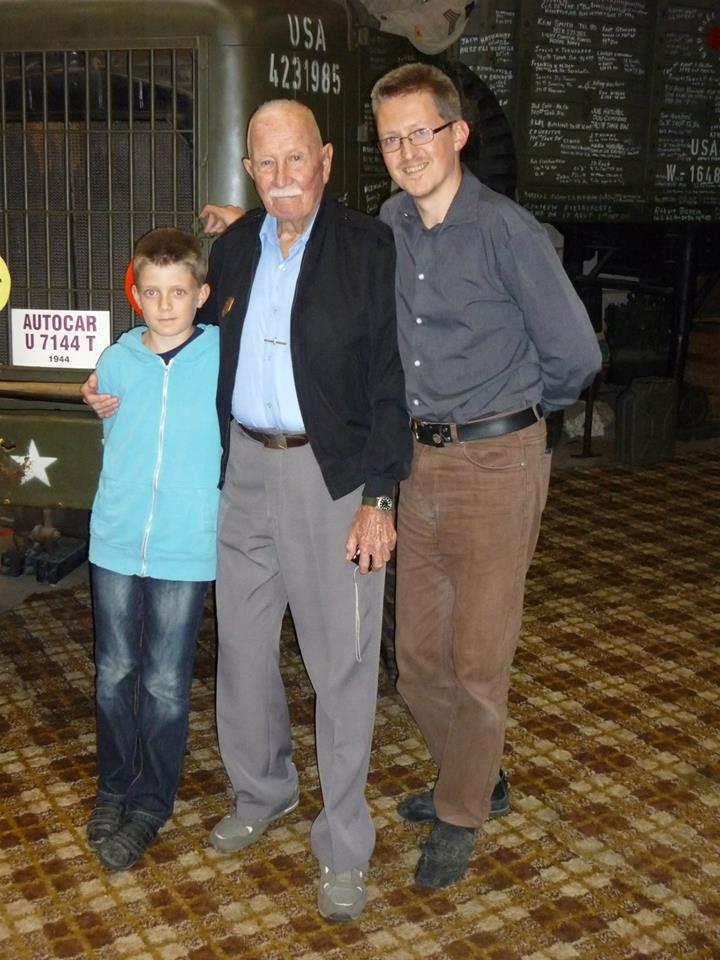
Bill Ryan, Michael and me at our meeting Saturday 14, 2013
